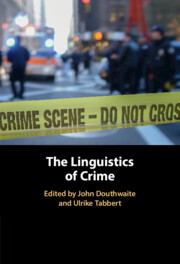Book contents
- The Linguistics of Crime
- The Linguistics of Crime
- Copyright page
- Contents
- Figures
- Tables
- Contributors
- 1 Editorial Introduction
- 2 The Metaphoric and Metonymic Conceptualisation of the Other
- 3 Prison Metaphors
- 4 Ideology in Mainstream Crime Fiction
- 5 A Critical and Stylistic Analysis of the Depiction of the Transnational Human Trafficking Victim in Minette Walters’ The Cellar
- 6 The Linguistic Construction of Political Crimes in Kurdish-Iraqi Sherko Bekas’ Poem The Small Mirrors
- 7 Stylistic Aspects of Detective Fiction in Translation
- 8 Transnational Adaptations of Sherlock Holmes
- 9 The Ethical Effects of Voice-Over Narration on a Victim Testimonial
- 10 Realising Betrayal
- 11 ‘Nossa Vida é Bandida’
- 12 Deviant Mind Style of a Schizophrenic Offender
- 13 Narrower or Broader Ground? The Role and Function of Metaphors in Legal Discourse
- 14 Condemning the Condemners
- 15 Ideology in Critical Crime Fiction
- Index
- References
2 - The Metaphoric and Metonymic Conceptualisation of the Other
Published online by Cambridge University Press: 05 January 2023
- The Linguistics of Crime
- The Linguistics of Crime
- Copyright page
- Contents
- Figures
- Tables
- Contributors
- 1 Editorial Introduction
- 2 The Metaphoric and Metonymic Conceptualisation of the Other
- 3 Prison Metaphors
- 4 Ideology in Mainstream Crime Fiction
- 5 A Critical and Stylistic Analysis of the Depiction of the Transnational Human Trafficking Victim in Minette Walters’ The Cellar
- 6 The Linguistic Construction of Political Crimes in Kurdish-Iraqi Sherko Bekas’ Poem The Small Mirrors
- 7 Stylistic Aspects of Detective Fiction in Translation
- 8 Transnational Adaptations of Sherlock Holmes
- 9 The Ethical Effects of Voice-Over Narration on a Victim Testimonial
- 10 Realising Betrayal
- 11 ‘Nossa Vida é Bandida’
- 12 Deviant Mind Style of a Schizophrenic Offender
- 13 Narrower or Broader Ground? The Role and Function of Metaphors in Legal Discourse
- 14 Condemning the Condemners
- 15 Ideology in Critical Crime Fiction
- Index
- References
Summary
Kövecses offers a cognitive exploration of the concept of the (not necessarily criminal) Other, approached from a metaphorical and metonymic angle. He argues that our human way of categorisation, in particular the ’internal-subject’ versus ’external-other’ relationship, is at its core a metaphorical way of perceiving the Other in conceptual categories. Douthwaite analyses a short story to show the application of the concepts identified by Kövecses apply concretely to crime and to crime-related texts.
- Type
- Chapter
- Information
- The Linguistics of Crime , pp. 16 - 38Publisher: Cambridge University PressPrint publication year: 2023
References
- 1
- Cited by



